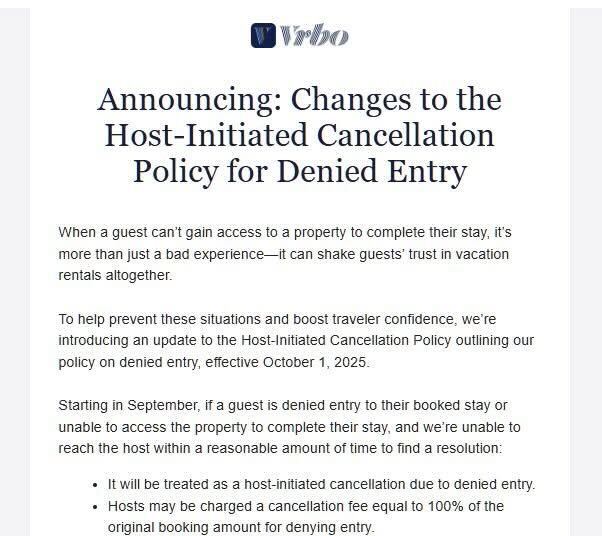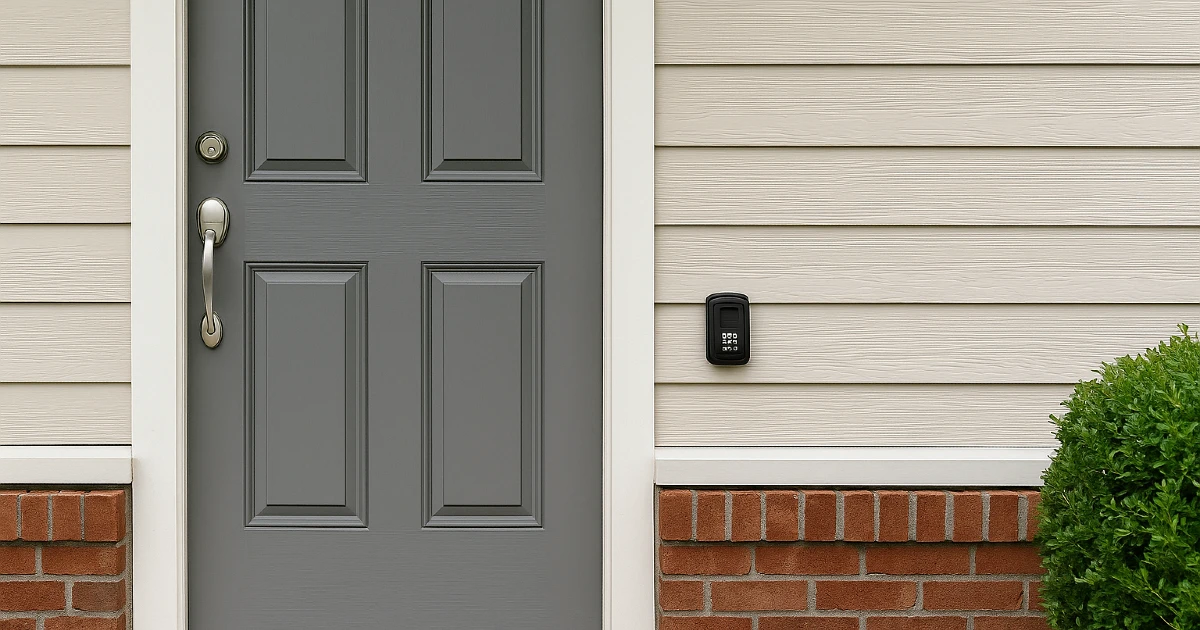If you just heard a scream, it might have been from the VRBO host closest to you after they read an email the company sent around last week.
In that email, VRBO (the platform owned by Homeaway, which stands for Vacation Rental by Owner) introduced a new host-initiated cancellation policy, effective October 1, 2025, that enforces harsh penalties on owners if they can't let their guests into the home in time. Under the new policy, if a guest cannot access the property at check-in due to host error (wrong code, unresponsive host, etc.), VRBO will:
- Refund the guest 100% of the booking amount
- Charge the host a cancellation fee up to 100% of the booking amount
So, not only would the property owner lose the rental income from the booking, they could also incur a fee that matches the entire amount of lost income. Imagine you rent out your property on VRBO for a week, for a total of $3,000. If your guest is unable to access the property for whatever reason, you could end up down $6,000 – $3K of lost income, and $3K of fees.
Naturally, hosts are concerned about the fairness of the policy, as well as potential scams and guest misuse of the rule. However, if you rent your home on VRBO, there are steps you can take to continue hosting without fear, including installing reliable check-in systems, having backup communication, and creating clear guest instructions.
Let's take a deeper dive into the policy change, and what landlords can do to minimize risk:
What changed in VRBO’s cancellation policy
The new host-initiated cancellation policy officially kicks in on October 1, 2025, after VRBO quietly announced it in August. On the surface, it looks like a clarification of existing rules. In practice, though, it’s a major shift in how much risk gets placed on the host.
The change is triggered in one very specific (and common) scenario: when a guest can’t access the property at check-in because of a host-related issue. That could mean a lockbox code that doesn’t work, a smart lock that fails, or simply an unresponsive host who doesn’t pick up the phone when the guest is arriving at the property. In those cases, VRBO now treats the situation as if the host canceled the stay outright.
Instead of just refunding the guest and moving on, VRBO has decided to make the host shoulder the entire burden. If a guest shows up and can’t get in, the host doesn’t just lose the payout they were counting on. They also get hit with a cancellation penalty of up to the same amount. That means a single failed check-in can turn into a double loss: no rental income, and a matching bill from VRBO on top of it. For many owners, that’s the equivalent of wiping out weeks—or even months—of earnings in one shot.
This new rule doesn’t replace VRBO’s existing cancellation fees; it stacks on top of them. Hosts are still subject to the old fee structure for cancellations made in advance:
- Cancel within 48 hours of check-in → 50% fee
- Cancel 48 hours to 30 days before check-in → 25% fee
- Cancel more than 30 days out → 10% fee
On top of that, VRBO has reserved the right to suspend listings that accumulate too many violations.
So, if you’re a VRBO host, the message is clear: make sure your guests can get into the property at check-in, every time, or risk financial penalties that can wipe out your rental income.

Why VRBO hosts are concerned
The new VRBO cancellation policy has quickly raised red flags among property owners and short-term rental hosts. The biggest worry is the potential for double losses. In the most extreme cases, landlords would be losing money they don't have; taking back the rental income is one thing, but doubling it could end up with the platform taking more from landlords than they have in cash on hand.
Hosts are also concerned about the potential for false claims. A guest could insist they were locked out when, in reality, they failed to follow check-in instructions. In these cases, the host may be left scrambling to prove otherwise, often with little recourse.
Another challenge is timing. If a guest arrives late at night and the host misses a phone call or text, that short lapse in communication could trigger a costly penalty. Or, if guests arrive at a different time then they originally stated they would arrive, hosts could be busy. Even with smart locks or keypad systems, technology can fail, and user error is always a possibility.
Many VRBO hosts feel the new policy shifts too much responsibility onto them and are questioning whether the platform remains worth the risk. Reddit threads and negative social media reaction have popped up in the days since the announcement, with hosts lambasting the policy as "crazy." Some are considering moving their rentals to other platforms like Airbnb.
What this means for VRBO owners and rental properties
For vacation rental owners, the policy adds a new layer of financial risk. Beyond service fees and booking commissions, hosts now face penalties tied to guest check-in problems—issues that are sometimes outside their control.
This means VRBO owners may need to rethink how they manage access to their properties. Communication will need to be more frequent and reliable. Check-in procedures may have to be simplified to minimize errors. Many owners are considering hiring co-hosts or property managers who can act as a safety net in case of last-minute issues.
For hosts with multiple properties, the stakes are even higher. A single mishandled check-in could wipe out the profit from several bookings. The new policy makes it clear that VRBO expects hosts to provide hotel-like consistency, but without offering the same level of operational support that hotels enjoy.
But if you're reading this, don't panic—this doesn't mean the end of your VRBO listing, it just means an increased weight on host responsibilities to consider. And there are plenty of measures property owners can take to ensure they never get hit with these hefty fines.
Tips for VRBO hosts to avoid costly penalties
One of the most effective strategies is to use a reliable smart lock or keypad entry system. Entry codes should be tested before every arrival, and a backup option—such as a hidden lockbox with a spare key—should be in place in case of failure. If landlords live near the property and have the means, it may be smart to test the entry system frequently and between guests.
Clear communication is equally important. Hosts should send check-in instructions multiple times, ideally through VRBO’s messaging platform where the communication can be documented. Automated reminders the day before and the morning of check-in can help prevent last-minute confusion. Additionally, hosts should always ask their guests what time they are expected to arrive, and be sure to keep their phones with them around that time.
Setting up a backup contact is another smart move. Whether it’s a co-host, local property manager, or trusted neighbor, having someone available during the check-in window can help prevent disputes. VRBO emphasizes quick responses, so ensuring a one-hour response time during arrivals is critical.
Finally, hosts should document everything. Save screenshots of messages, confirm that guests have received entry instructions, and keep a record of when codes are sent. This documentation can be invaluable if a dispute escalates.
Read more: VRBO vs Airbnb for hosts: Which is better for landlords?
Why VRBO hosts still need protection
Even with careful planning, the new cancellation policy highlights the risks of relying solely on platform protections. VRBO does not cover damage that happens outside of an active booking window. If a storm, fire, or act of vandalism damages a property while it sits vacant, the host bears the full cost.
Liability coverage is also limited. A serious injury on the property could result in a lawsuit that far exceeds VRBO’s protections. And if the property becomes uninhabitable for an extended period, there is no guarantee of income reimbursement.
This is why many VRBO hosts look beyond platform perks and invest in landlord insurance or short term rental insurance. Unlike VRBO’s policies, insurance can cover storm damage, fire damage, liability claims, and other unpredictable risks that landlords face. For those who see their rentals as long-term investments, relying only on VRBO is risky. Insurance adds a layer of security that platforms cannot match, especially as rules and policies can change at any time.







.png)
.jpg)
.jpg)


.png)